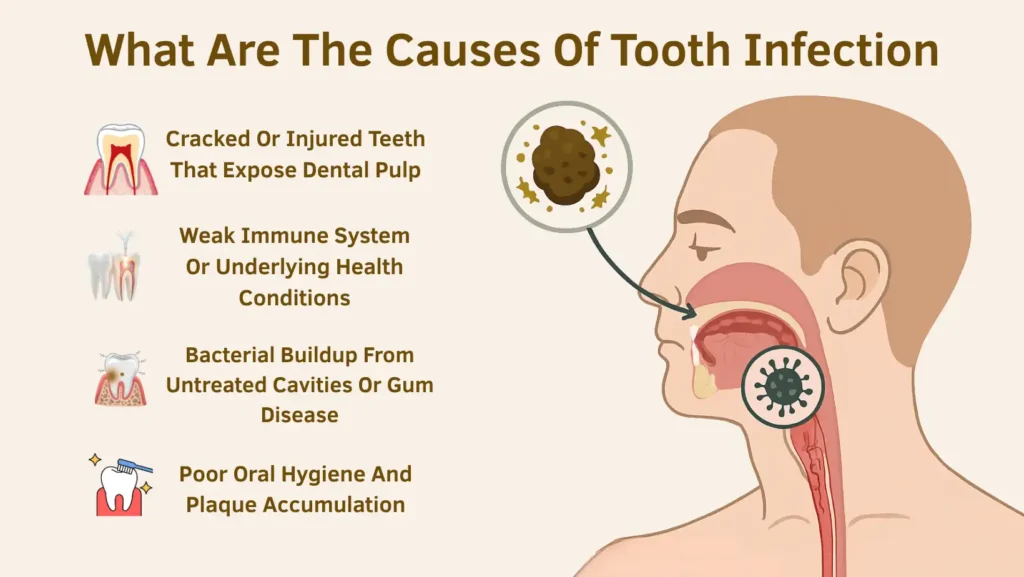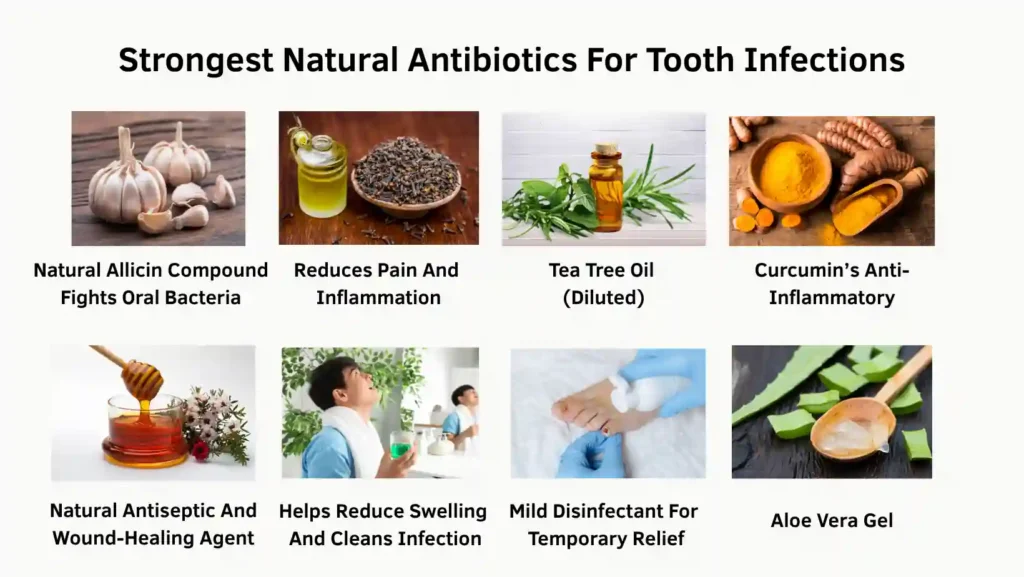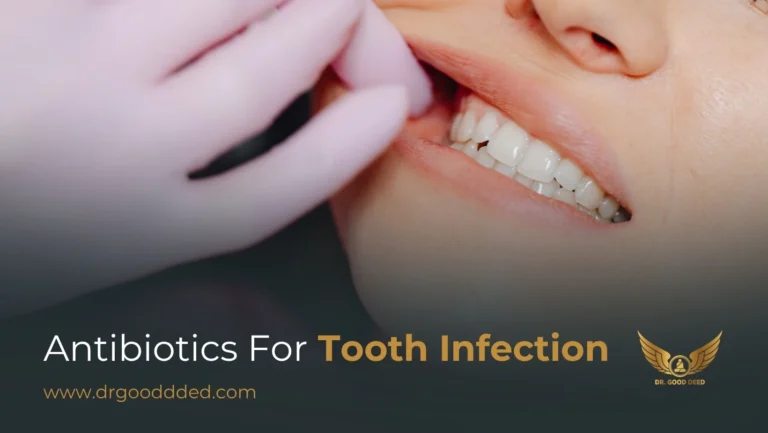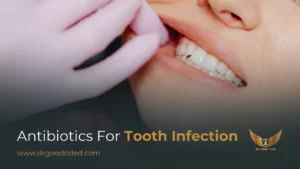Tooth infections can cause severe pain, swelling, and discomfort that disrupt your daily life. The strongest natural antibiotic for tooth infection is often considered garlic because of its active compound called allicin , which can kill harmful bacteria inside the mouth. However, other natural ingredients like clove oil, turmeric, tea tree oil, and manuka honey also show strong antibacterial effects and can help control infection symptoms until professional care is available.
Understanding how these natural antibiotics work and when to use them safely is important to protect your teeth and gums.
What Are The Causes Of Tooth Infection

A tooth infection happens when bacteria reach the inner pulp of the tooth, which contains nerves and blood vessels. Here’s how it usually develops:
Bacterial Buildup From Untreated Cavities Or Gum Disease
If cavities are ignored, bacteria multiply and penetrate deeper layers of the tooth. Gum disease (inflammation and bleeding of gums) can also cause infection by loosening gum tissue and exposing the root.
Poor Oral Hygiene And Plaque Accumulation
Plaque is a sticky film that forms when food and saliva mix. Without regular brushing and flossing, plaque hardens into tartar and provides a perfect place for bacteria to grow, triggering infection.
Cracked Or Injured Teeth That Expose Dental Pulp
Even a small crack or chipped tooth can allow bacteria to enter the pulp. Once inside, the infection can spread quickly, causing severe pain and sometimes abscesses (pockets of pus).
Weak Immune System Or Underlying Health Conditions
If your immune system is weak due to diabetes, stress, or poor diet, your body may not fight bacteria effectively. This makes it easier for a simple cavity to turn into a painful infection.
Why Tooth Infections Can Spread If Untreated
If a tooth infection is ignored, bacteria can spread from the tooth to nearby tissues, bones, or even into the bloodstream, leading to a condition called sepsis (a body-wide infection). That’s why prompt treatment is important.
Understanding Natural Antibiotics And How They Work
Natural antibiotics are plant-based or food-derived substances that help stop bacterial growth or kill harmful microbes. They can be an excellent supportive approach to manage early signs of infection.
What Makes A Natural Ingredient Antibacterial
Natural antibiotics like garlic, honey, and turmeric contain compounds that damage bacterial cell walls or block enzymes bacteria need to survive. For example, garlic’s allicin stops bacteria from reproducing, while honey’s hydrogen peroxide content slows infection spread.
The Difference Between Natural And Prescription Antibiotics
Prescription antibiotics directly target and kill specific bacterial strains and are needed for deep infections. Natural antibiotics, on the other hand, are mild and best used as early-stage care or prevention, not as a substitute for professional treatment.
Safety And Limitations Of Natural Remedies
Though they’re natural, these remedies can still irritate your gums or cause allergic reactions. Always dilute essential oils like clove or tea tree oil and never swallow them. If symptoms worsen, see a dentist immediately.
When Professional Treatment Is Necessary
You should always seek dental care when the infection causes severe pain, swelling, or fever. If your jaw becomes tender or you have difficulty swallowing, it’s time for professional antibiotics and possible root canal treatment.
Strongest Natural Antibiotics For Tooth Infections

Let’s look at the most trusted and strongest Natural Antibiotics For Tooth Infection that can reduce pain, swelling, and bacterial growth safely.
Garlic: Natural Allicin Compound Fights Oral Bacteria
Garlic is often considered the strongest natural antibiotic for tooth infection because allicin acts like a natural antibacterial agent. Crush one clove to release allicin and mix it with a drop of coconut oil before applying gently to the affected area. Avoid direct contact for more than a few minutes to prevent gum irritation.
Clove Oil: Reduces Pain And Inflammation
Clove oil is a natural anesthetic and antiseptic. Its main compound, eugenol , helps numb pain and kill bacteria. Mix two drops with a teaspoon of olive oil and dab it on the sore tooth using a cotton ball.
Turmeric: Curcumin’s Anti-Inflammatory Properties
Turmeric’s curcumin compound reduces inflammation and fights bacterial growth. You can make a thick paste using turmeric powder and water, then apply it on the gum line for relief.
Saltwater Rinse: Helps Reduce Swelling And Cleans Infection
A warm saltwater rinse helps flush out bacteria and pus while reducing gum inflammation. Mix half a teaspoon of salt in a cup of warm water and rinse for 30 seconds twice daily.
Manuka Honey: Natural Antiseptic And Wound-Healing Agent
Manuka honey from New Zealand is rich in methylglyoxal, which acts as a natural disinfectant. It helps soothe gums and speed up healing. Apply a small amount to the affected area after brushing.
Tea Tree Oil (Diluted): Antimicrobial Effects On Oral Bacteria
Tea tree oil has strong antibacterial and antifungal properties. Always dilute it with a carrier oil, like coconut or olive oil, before applying. Never swallow tea tree oil, as it can be toxic in large amounts.
Aloe Vera Gel: Soothes Gums And Reduces Bacterial Load
Aloe vera gel cools irritated gums and kills harmful bacteria. Apply a thin layer of aloe gel on the affected area twice daily. It also helps reduce swelling.
Hydrogen Peroxide Rinse: Mild Disinfectant For Temporary Relief
Hydrogen peroxide (3% solution) can clean the infected area and kill bacteria. Mix equal parts of hydrogen peroxide and water, swish in your mouth for 30 seconds, then spit out. Do not swallow it.
Home Remedies For Relief From Tooth Infections
These natural home remedies for tooth infection can help control symptoms and prevent worsening while you arrange dental care.
Warm Saltwater Rinses Twice Daily
Saltwater reduces swelling and clears bacteria naturally. It’s the easiest home remedy for relief from tooth infections and can be done multiple times a day.
Cold Compress To Reduce Swelling
Wrap ice in a towel and apply it to the cheek for 10-15 minutes to numb pain and reduce inflammation.
Applying Diluted Clove Or Peppermint Oil For Pain Relief
Both oils provide quick relief from pain. Dilute them properly and apply with a cotton ball for a few minutes.
Drinking Herbal Teas (Green Tea, Turmeric) For Inflammation Support
Green tea contains catechins (antioxidants) that reduce bacteria. Turmeric tea helps fight swelling from the inside. Drink one or two cups daily.
Maintaining Oral Hygiene While Using Home Treatments
Brush gently with a soft toothbrush and use fluoride toothpaste. Avoid sugary foods that feed bacteria. Keep your mouth clean after every meal.
Natural Home Remedies Vs. Medical Antibiotics — Which Is Better?
Both options play a role, but the choice depends on how deep or severe the infection is.
When Natural Options May Be Enough For Mild Infections
If you catch the infection early, natural antibiotics like garlic or clove oil may stop it from spreading. Always maintain good oral hygiene to support recovery.
Risks Of Delaying Treatment For Deep Infections
Delaying proper treatment can lead to abscess formation and jawbone damage. Deep infections require antibiotics and dental cleaning or extraction.
Combining Dental Care With Safe Natural Remedies
You can use natural remedies along with dentist-recommended antibiotics for faster healing. For example, a salt rinse or honey application supports gum repair.
How To Know When It’s Time To See A Dentist
If pain lasts more than 48 hours, swelling increases, or fever appears, contact your dentist. Ignoring symptoms can cause serious complications.
When To See A Dentist For Tooth Infection
You must see a dentist if you notice any of the following:
Severe, Persistent Pain Or Swelling In The Jaw
This often signals an abscess (a pus-filled pocket) or deep infection in the bone.
Fever, Bad Taste, Or Pus Discharge In The Mouth
These are clear signs of active bacterial infection that need immediate care.
Pain Spreading To The Ear, Cheek, Or Neck
If pain travels beyond the tooth, the infection may be spreading through tissues.
Difficulty Swallowing Or Breathing — Emergency Symptoms
If swallowing or breathing becomes hard, go to the emergency room immediately, as the infection may be affecting your airway.
Prevention Tips For Avoiding Future Tooth Infections
A remedy for treating tooth infections is prevention. Taking small steps can save you from painful dental issues.
Brush And Floss Regularly With Fluoride Toothpaste
Brush twice a day and floss to remove trapped food. Use fluoride toothpaste to strengthen enamel and prevent bacterial attack.
Limit Sugar And Processed Foods That Feed Bacteria
Sugary foods encourage bacterial growth. Replace soda and candies with fresh fruits and water.
Get Dental Check-Ups Twice A Year
Routine visits help detect cavities or gum issues early before they become serious infections.
Rinse With Natural Antibacterial Mouthwashes
Rinse with saltwater, green tea, or diluted tea tree oil to keep your mouth clean and bacteria-free.
FAQs
What Is The Best Natural Antibiotic For Tooth Infection?
The strongest natural antibiotic for tooth infection is garlic due to allicin, but clove oil and manuka honey are also highly effective for pain and bacterial control.
Can A Tooth Infection Heal Naturally Without Antibiotics?
Mild infections may improve with home care, but deep infections need professional antibiotics. Delaying treatment increases the risk of severe pain and swelling.
How Long Should I Use Home Remedies Before Seeing A Dentist?
Use home remedies for up to two days. If the pain or swelling doesn’t improve, visit your dentist immediately to prevent the infection from spreading.
Is Garlic Or Clove Oil Better For Treating Tooth Infections?
Both work well. Garlic kills bacteria, while clove oil numbs pain. You can alternate them for better results as part of your natural care routine.
Can I Use Salt Water Rinse Every Day For A Tooth Infection?
Yes. A warm saltwater rinse is safe for daily use and helps flush bacteria, ease inflammation, and support gum healing.
Are Natural Remedies Safe During Pregnancy?
Most natural remedies, like saltwater or honey, are safe, but avoid strong essential oils like clove or tea tree oil unless approved by your doctor.















Leave a Comment